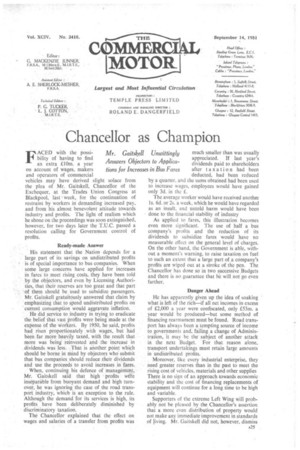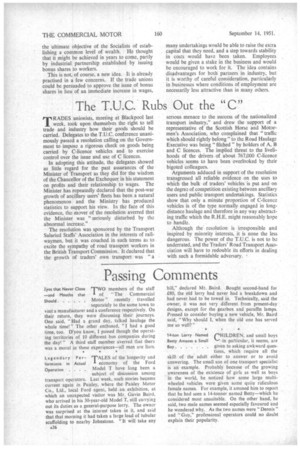Chancellor as Champion
Page 27

Page 28

If you've noticed an error in this article please click here to report it so we can fix it.
FACED with the possi,bility of having to find an extra £10m. a year on account of wages, makers and operators of commercial vehicles may have derived slight solace from the plea of Mr. Gaitskell, Chancellor of the Exchequer, at the Trades Union Congress at Blackpool, last week, for the continuation of restraint by workers in demanding increased pay, and from his almost benevolent attitude towards industry and profits. The light of realism which he shone on the proceedings was soon extinguished, however, for two days later the T.U.C. passed a resolution calling for Government control of profits.
Ready-made Answer His statement that the Nation depends for a large part of its savings on undistributed profits is of special importance to bus companies. When some large concerns have applied for increases in fares to meet rising costs, they have been told by the objectors, and even by Licensing Authorities, that their reserves are too great and that part of them should be used to subsidize passengers. Mr. Gaitskell gratuitously answered that claim by emphasizing that to spend undistributed profits on current consumption would aggravate inflation. ' He aid service to industry in trying to eradicate the belief that vast profits were being made at the expense of the workers. By 1950, he said profits had risen proportionately with wages, but had been far more heavily taxed, with the result that more was being reinvested and the increase in dividends was less. That is another point which should be in mind by objectors who submit that bus companies should reduce their dividends and use the proceeds to avoid increases in fares. When continuing his defence of management, Mr. -Gaitskell said that high profits we inseparable from buoyant demand and high turnover, he was ignoring the case of the road transport industry, which is an exception to the rule. Although the demand for its services is high, its profits have been deliberately diminished by discriminatory taxation.
The Chancellor explained that the effect on wages and salaries of a transfer from profits was much smaller than was usually appreciated. If last year's dividends paid to shareholders after taxation had been deducted, had been reduced by a quarter, and the sums obtained had been used to increase wages, employees would have gained only 3d. in the £.
The average worker would have received another Is. 6d. or 2s. a week, which he would have regarded as an insult, and untold harm would have been done to the financial stability of industry As applied to fares, this illustration becomes even more significant. The use of half a bus company's profits and the reduction of its dividends to subsidize fares would have no measurable effect on the general level of charges. On the other hand, the Government is able, without a moment's warning, to raise taxation on fuel to such an extent that a large part of a company's profits are wiped out at a stroke of the pen. The Chancellor has done so in two successive Budgets and there is no guarantee that he will not go even farther.
Danger Ahead He has apparently given up the idea of soaking what is left of the rich—if all net incomes in excess of £2,000 a year were confiscated, only £53m. a year would be produced—but some method of financing rearmament must be found. Road transport has always been a tempting source of income to governments and; failing a change of Administration, it. may be the subject of another attack in the next Budget. For that reason alone, transport undertakings must retain large amounts in undistributed profits.
Moreover, like every industrial enterprise, they need greater reserves than in the past to meet the rising cost of vehicles, materials and other supplies There is no sign of an approach towards economic stability and the cost of financing replacements of equipment will continue for a long time to be high and variable.
Supporters of the extreme Left Wing will probably not be pleased by the Chancellor's assertion that a more even distribution of property would not make any immediate improvement in standards of living. Mr. Gaitskell did not, however, dismiss the ultimate objective of the Socialists of establishing a common level of wealth. He thought that it might be achieved in years to come, partly by industrial partnership established by issuing bonus shares to workers.
This is not, of course, a new idea. It is already practised in a few concerns. if the trade unions could be persuaded to approve the issue of bonus shares in lieu of an immediate increase in wages. many undertakings would be able to raise the extra capital that they need, and a step towards stability in costs -would have been taken. Employees would be given a stake in the business and would be encouraged to work for it. The idea contains disadvantages for both partners in industry, but it is worthy of careful consideration, particularly in businesses where conditions of employment are necessarily less attractive than in many others.




















































































